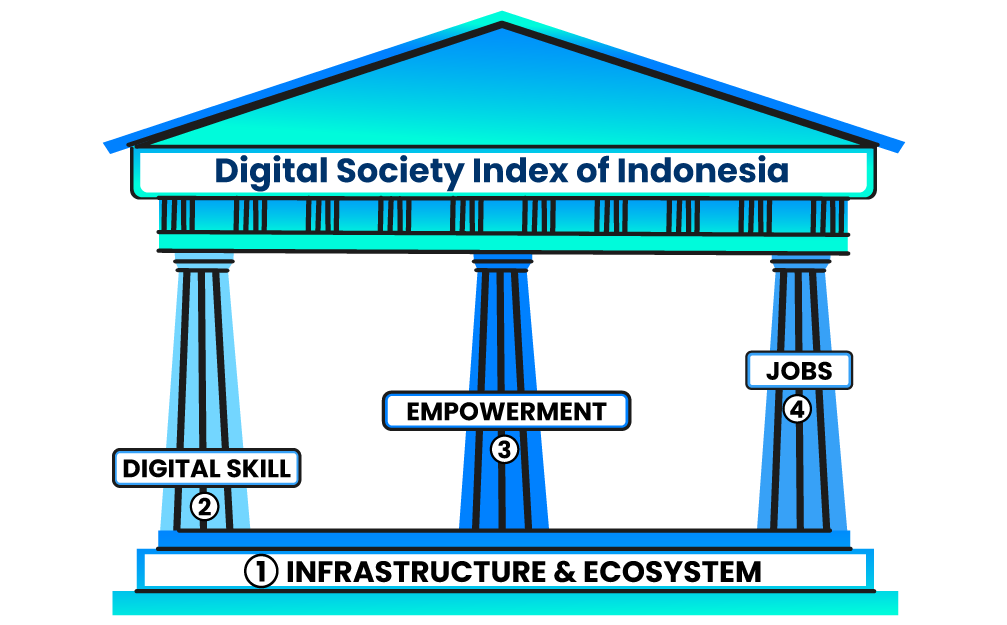Digital Society
A digital society is one in which people regularly utilize digital technology in their daily lives, where all activities carried out electronically and paperless have become the norm. This society is driven by digitalization, with its essential character shaped by advancements in digital technology, wherein every aspect of life—ranging from production, distribution, to the utilization of all its core activities—is included"
Pillars of the Indonesia Digital Society Index (IDSI)
Infrastructure and Ecosystem
Detail
Infrastructure and Ecosystem
Digital infrastructure constitutes the fundamental foundation in determining the quality of the ecosystem and environment within a digital society. This pillar emphasizes the importance of equitable access to digital infrastructure. It is composed of three sub-pillars, namely:
It illustrates society’s access to digital infrastructure as well as the level of technology adoption within industries.
It provides an overview of the supporting ecosystem for digital learning, such as the availability of schools with internet access and higher education institutions in the field of ICT.
It illustrates the extent to which local governments have achieved maturity in implementing digital-based governance operations.
Digital Literacy
Digital literacy refers to an individual’s ability to use digital technologies effectively, safely, and responsibly, while remaining aligned with prevailing values and cultural norms. This pillar consists of three sub-pillars, namely:
Basic digital literacy refers to the fundamental knowledge and core skills that individuals must possess in order to effectively utilize digital technologies. This dimension encompasses proficiency in operating basic digital devices and applications, as well as the capacity for critical thinking in accessing and processing information.
This refers to an individual’s ability to protect personal devices and accounts, safeguard privacy, and identify as well as mitigate security risks in the use of digital technologies. Within the IMDI framework, the dimension of digital security is examined from two perspectives: device security and personal security.
It derives from respondents’ understanding of the importance of protecting personal data, behaving respectfully and responsibly in digital interactions, and upholding intellectual property rights by refraining from plagiarism or the distribution of illegal content.
Empowerment
Digital empowerment of society reflects individuals’ ability to leverage technology to enhance quality of life, increase productivity, and foster economic self-reliance.
It measures societal engagement in commercial transactions through e-commerce platforms, both as consumers/buyers and as producers/sellers.
It examines the utilization of technology-based financial services, such as mobile banking, e-wallets, digital payments, and other fintech solutions that expand access to financial services.
This encompasses the use of various digital services beyond e-commerce and finance, such as online transportation, e-learning, and the use of social media for promotional purposes. In addition, this sub-pillar also assesses societal participation in the creation of digital products, including applications, creative designs, and digital content that generate economic added value.
Jobs
The Employment pillar focuses on the role of digital skills in the labor market. It highlights two dimensions: the demand for digital skills and the supply of digital talent possessing specific digital competencies.
It illustrates the digital skills required by industry, ranging from basic to advanced levels. This sub-pillar also encompasses the role of companies in providing digital training.
It illustrates the availability of a workforce with relevant digital skills, encompassing the application of digital competencies in the workplace as well as societal participation in digital training programs.

